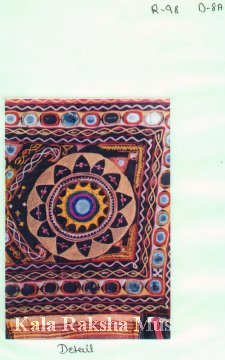|
Description
|
| MATERIALS: Cotton and silk cloth, cotton and silk threads, mirrors and tassels. CONSTRUCTION: Hand and Machine stitched, hand embroidered: chain,double buttonhole, cretan, herringbone, buttonhole filling, detached chain stitches. MOTIFS: Popti, makodiyun, ghodi goto, gol tak, goto, daantarle. COLOURS : Multicoloured on black and red. STYLE REMARKS: The conventions here were traditional to all three subgroups: same body and borders, same colours. Dhebaria variations can be recognized by narrower, pointed leaves. The centre pattern derives from a class patrons. This piece has been repaired: old mirrors are replaced by new ones with stitches. CULTURAL SIGNIFICANCE: The toran is used throughout western India as an auspicious welcoming. The simplest version is a string of auspicious leaves, here represented by the mashru ''leaves.'' CULTURAL REMARKS: Rabaris use a toran as part of a seven piece set that decorates the doorway and walls between outer and inner rooms of their house. Toran, doorway hanging. |
Toran
-INNOVATION: RE-PURPOSE, RE-INVENT, RE-CYCLE
-Copyright Statement

COPYRIGHT INFORMATION ~ When using this image, the credit information should be in the following format: Image courtesy of the Kala Raksha Museum.

COPYRIGHT INFORMATION ~ When using this image, the credit information should be in the following format: Image courtesy of the Kala Raksha Museum.